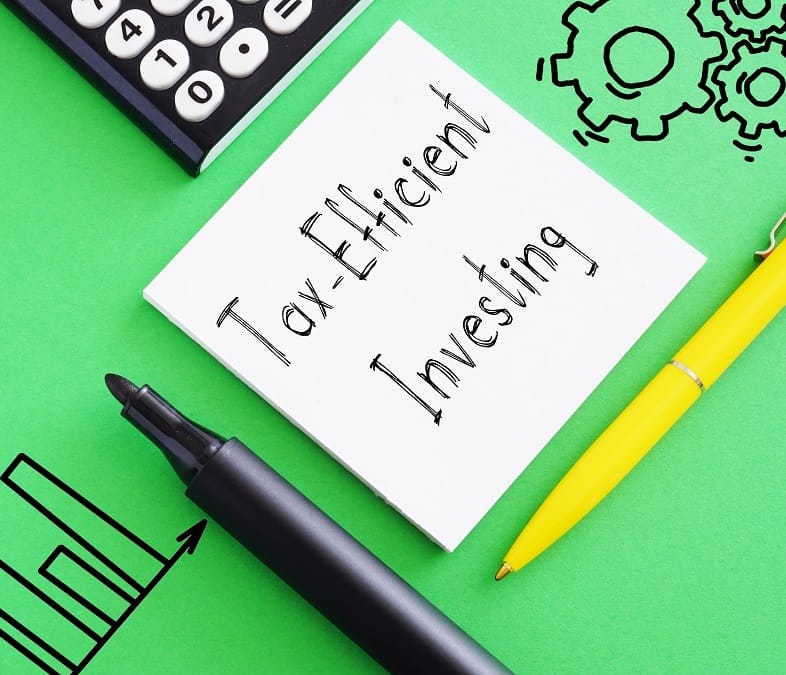Every investment comes with a price tag. Out of all the expenses, taxes take the greatest bite out of your returns. The good news is that tax-efficient investing may help you reduce your tax burden, whether you're trying to save for retirement or make money.
In this article, we will discuss how taxes impact your investments and how you should invest your money tax-efficiently:
- Why is tax efficient investing important?
- Types of tax efficient investment accounts
- Tax efficient investment strategies
- How can you invest tax-efficiently?
- Manage your taxes.
Why is tax efficient investing important?
The Schwab Center for Financial Research[1] examined the long-term impact of taxes and other fees on investment returns. It concluded that while asset allocation and investment selection are the most important aspects, reducing taxes also has a considerable effect. This is because the money you paid in taxes is already gone, and you missed out on the potential growth that money could have created if it had remained invested. Hence, your post-tax returns are more important than your pre-tax returns because you only get to spend the money after paying taxes.
Types of tax efficient investment accounts
There are various kinds of tax efficient investments, such as retirement accounts, education investment accounts, and individual and self-employment retirement accounts. The best tax efficient investments include multiple factors, such as liquidity, contribution flexibility and many more. However, all these accounts fall under the two most common types of investment accounts that this article will be focusing on: taxable accounts[2] and tax-advantaged accounts[3].
Taxable accounts
Taxable investment accounts enable you to buy and sell equities, bonds, and funds. Any increase in the value of your investments or income from your investments will be subject to tax. Depending on how long you have held on to your investment, the income may be taxed at a regular income tax rate or at a lower long-term capital gains rate[4].
Taxable accounts do not provide any tax benefits, but they are more flexible in terms of investment. They have fewer restrictions in management and are generally created through online brokerages (for example, Vanguard[5], IB[6], and Degiro[7]). But you may choose to open one at your bank or with your financial advisor.
Despite receiving no tax benefits, taxable investment accounts still make sense, especially if you have already maxed out your tax-advantaged accounts and you have spare funds. One of the main reasons for having a taxable investment account is liquidity. Unlike tax-advantaged accounts, taxable accounts allow you to withdraw your investment principal at any time without paying any taxes or penalties. This, in turn, gives you more space to budget your other investment accounts and time horizon.
Tax-advantaged accounts
Tax-advantaged accounts can have their taxes deferred or exempted, meaning you will get an upfront tax break from deducting your contribution to the account. Some good examples of the best tax advantaged investments are retirement accounts, education savings, and savings for healthcare. Through your tax-advantaged accounts, you can invest in equities, bonds, and both actively and passively managed funds. You only pay taxes when you withdraw all of your money before your retirement. By the time you retire, the tax rate will be much lower because you will not have additional income to tax. However, tax-advantaged accounts have annual contribution limits. Therefore, it may not be ideal for every investor due to the contribution restrictions and the general lack of flexibility.
Tax-advantaged accounts come in two forms:
- Pre-tax or tax-deferred accounts[8] enable you to delay paying your taxes until you withdraw from your investment.
- After-tax accounts[9] allow you to add the net amount in your account, i.e., after the tax has been paid. Which means, in the future, when you withdraw it, you will no longer need to pay taxes on it.
Tax efficient investment strategies
Taxes are a crucial factor to keep in mind when making investing decisions, but they shouldn't be the sole determinant. Even if tax laws and rates change, the importance of considering taxes while making financial decisions should not. In the long run, taxes might have a negative impact on your long-term financial goals. If your current income tax rate is high, you may want to evaluate the tax implications of any investment adjustments you make. Here are a few investment ideas that will save you money in the long run:
- Maximise your tax-advantaged accounts: One of the most common pieces of financial advice out there is to max out your tax-advantaged accounts. This means contributing the maximum amount to your retirement and other tax-advantaged types of accounts. Of course, it also depends on your income and overall financial situation whether you are able to maximise these accounts. Some may not have sufficient income to prioritise them. An example of a tax-advantaged account in Europe is the third-pillar pension[10]. In the UK, it is the Individual Savings Account (ISA)[11] that protects your investment from capital gains tax[12] and income tax. In the US, it is the 401k or Roth IRA[13].
- Diversify your tax-efficient accounts: Using a variety of investment account types allows you to combine revenue sources in retirement in order to reduce your taxes. The tax consequences of various investment account types vary. Combining tax-advantaged and non-tax-advantaged investment funds is an option. You get to reap the benefits of lower or no taxes on one investment while still having the flexibility of liquidity, contribution amount, and withdrawal of taxable accounts.
- Choose tax-efficient investment instrument: Tax advantages can be gained by investing in certain types of financial products. For example, investors might benefit from lower costs and fewer tax obligations by purchasing tax-advantaged bonds. Stocks, which are liable for taxation, can be offset by tax-advantaged assets, such as government bonds. For example, Eurobonds, which are debt securities issued in a foreign currency by governments or corporations.
- Match investments with the right account type: You should keep your investments in accounts that handle taxes the right way. As taxable bonds and stock funds with high turnover produce taxable income, they should be maintained in tax-deferred accounts in order to maximise their tax advantages. On the other hand, a taxable brokerage account is a preferable place to invest in tax-neutral investments like mutual funds and municipal bonds. This is because your investments are not incurring a high tax rate to begin with. Therefore, there is no need to delay paying them and there is no need to make the funds illiquid.
- Minimise paying capital gains tax: For the most part, hanging on to an investment that you intend to sell in order to avoid taxes is not worth the effort. In the United States, long-term capital gains are taxed at a lower rate than short-term capital gains and lower than income tax[14]. An asset that has been kept for more than a year is subject to a long-term capital gains tax. Your taxable income and filing status determine how much long-term capital gains tax you pay. Therefore, waiting to sell valued equities until they are eligible for long-term capital gains treatment may be a good idea. Of course, no such benefits exist in the EU or EEA. However, you can always relocate to member states that do not mandate investors to pay capital gains once you sell them, such as Belgium, Slovakia, Slovenia, Luxembourg, and the Czech Republic.
- Harvest losses to offset gains: This is only relevant if you have a business and you would like to offset the losses against gains with taxes. In the EU, there are loss carryover provisions[15]. Firms have the option of either taking out their current year losses against future earnings (known as carryforwards) or current year losses against prior profits (known as carrybacks). Many businesses are involved in ventures with varying degrees of risk, and they do so in sectors that are subject to significant swings in the economic cycle. Carryover provisions improve the tax code's balance across different investments and time periods because they allow businesses to adjust their risk and profits. Some states' tax codes allow enterprises to roll over their losses for an infinite or a limited number of years provided that the company is taxed on its long-term average profitability. Luxembourg[16] has the most lenient restriction of 17 years to carry forward their net operating losses. Estonia and Latvia[16] are the only states without a time limit. In addition to year-end limits, deductible limits are also imposed in a number of nations. Italy's loss deduction is limited to 80% of taxable income.
How can you invest tax-efficiently?
To invest in a way that minimises your tax burden, you'll need to do some research. Despite the fact that taxes should never be the major driver of an investing strategy, a higher tax understanding has the potential to increase your post-tax profits. In order to minimise income taxes, you can employ a variety of methods, including careful selection of investment products, timing of buys and sells, account selection, taking advantage of realised losses, and even particular strategies like charitable giving. Investing decisions should be based on your long-term objectives and current financial condition.
Manage your taxes
How much money you pay in taxes can be influenced by the timing and type of investments you buy and sell. Preparation is key to tax management, as is staying on top of due dates and budgeting ahead of time, as well as making use of all available resources and remaining calm under pressure. The following are some tips on managing your taxes:
- Track important tax dates: Understanding when your income tax returns are due is critical. You should be familiar with the tax season, the filing deadline for tax returns, whether you may request an extension, and the manner of payment for your tax return. To make sure you submit your taxes on time, you'll need to set up alerts as soon as you know the deadlines.
- Keep your taxes organised: The filing process will be smoother for you if your taxes are more organised. Ascertain exactly what documentation is required and store it somewhere safe. When you receive a receipt or statement that could be relevant to your income tax return, save it in a safe place where you can find it later if necessary.
- Keep learning about your taxes: Additionally, you'll need to become familiar with tax laws. Become familiar with your state's income tax standards and find out how much tax you must pay. Visit a bookkeeper or attend a session to learn how to do it yourself.
Defer taxes
Depending on the jurisdiction, you may have to pay taxes on the gains if you sell your investment. You will also be taxed on the earnings of your investments whether you sell them or not. Most investors prevent this by holding their investments to avoid short-term capital gains tax and reinvesting their earnings. Compounding is one of the most commonly preferred methods, not only because it grows significantly with time but also that it reduces your taxable gains as your investment grows. The increase in earnings and reduction in tax payments result in significant growth in your investment.
However, some investment assets are more tax-efficient than others which you can choose from the start. There are tax-managed funds specifically designed to lower taxes on your investments by not buying dividend-based stocks, selling some of them at a loss to offset gains, or holding on to the stocks. ETFs are also a tax-efficient investment because they trigger fewer capital gains. Bonds, especially municipal bonds, are not taxed at a state level on income. Municipal bonds are issued by the government to fund state projects. Corporate bonds, however, do not fall under this and is better off invested under tax-advantaged accounts like under voluntary pensions. Actively managed funds, however, are not as tax-efficient because they trade more often and incur more capital gains taxes for you.
Reduce taxes
Not everyone may want to or have the circumstances to invest their money. You may rather want to invest in your business. Suppose you have a business and you want to reduce your taxes. In that case, the only suitable and legally acceptable way is to increase your company expenses and write your spendings off under business-related expenditure. This will decrease your income and reduce your taxes correspondingly.
If you would like to buy a home, there are a lot of tax saving methods. However, it depends on the jurisdiction you are in. Some countries allow tax breaks on mortgage payments. Some save on capital gains from selling a home and moving to a new primary residence, especially if your new home needs renovations or improvements.
Summary
When it comes to investing, tax minimisation is one of the most important aspects. Tax-efficient assets should be held in taxable accounts, and less tax-efficient investments should be held in tax-advantaged accounts. Your accounts will have a better chance of increasing in value. Even though investing in a tax-favoured account is preferable, there may be circumstances when another factor takes precedence over taxes, such as liquidity. Due to strict contribution restrictions, some investments may be required to be held in taxable accounts. Overall, your decisions should depend on your financial goals, circumstances, and the options available.
Many investors are eager to learn about the next market-beating investment opportunity, but few make the same effort to reduce taxes. Astute tax management is an important part of any effective financial plan. Make sure that you're doing everything you can to keep your money. Also, consult a tax advisor: your tax savings may result in a significant increase in your annual return.
Frequently Asked Questions
What is tax-efficient investing and why does it matter?
Tax-efficient investing means structuring your portfolio to reduce the impact of taxes on your returns. Since taxes can significantly erode profits over time, smart tax planning ensures you keep more of your gains working for your long-term financial goals.
What types of tax-advantaged accounts are available in the EU and globally?
Common tax-advantaged accounts include retirement savings plans, education savings accounts, and healthcare-related funds. Examples are the third-pillar pension in Europe, ISAs in the UK, and 401(k) or Roth IRA accounts in the US. These accounts provide tax breaks either upfront or upon withdrawal, helping investors grow wealth more efficiently.
What strategies help individual investors reduce investment taxes?
Popular strategies include maximizing contributions to tax-advantaged accounts, diversifying between taxable and tax-advantaged accounts, using tax-efficient instruments like government bonds or ETFs, and applying tax-loss harvesting where applicable. Matching the right asset to the right account type is also key to minimizing unnecessary tax burdens.
List of References
- Source: schwab.com
- Source: morningstar.com
- Source: investopedia.com
- Source: investopedia.com
- Source: investor.vanguard.com
- Source: interactivebrokers.com
- Source: degiro.com
- Source: investopedia.com
- Source: investopedia.com
- Source: investopedia.com
- Source: gov.uk
- Source: investopedia.com
- Source: investopedia.com
- Source: turbotax.intuit.com
- Source: eur-lex.europa.eu
- Source: taxfoundation.org






